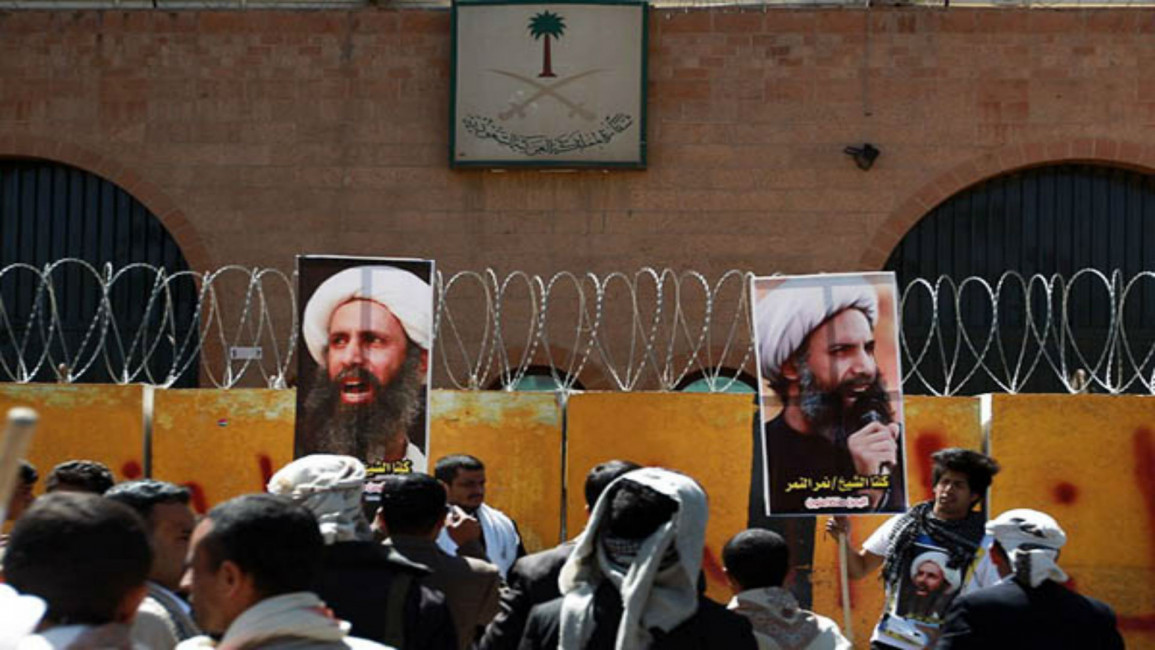
Death sentence for Saudi Shia cleric 'will spark unrest'
Sheikh Nimr Baqir al-Nimr has been a thorn in the side of the Saudi authorities for years.
An outspoken cleric and long-standing critic of the government's discriminatory policies towards his minority Shia sect, Nimr is set to be executed after the Saudi supreme court upheld a death sentence issued against the sheikh in October 2014.
His fate now rests precariously in the hands of King Salman, who has the power to commute his sentence if he so chooses.
According to Amnesty International, which has condemned the verdict as "appalling", Nimr’s charges include "disobeying the ruler", "inciting sectarian strife" and "encouraging, leading and participating in demonstrations" against the government.
He is also accused of violently resisting arrest by opening fire on security forces during a car chase in July 2012, although his brother, Mohammed, strongly disputes this.
Mohammed claims that Nimr was driving alone from a farm to his home in Awamiyya when security forces began chasing his car, leading to a short pursuit in which Nimr was shot in the leg and arrested. Nimr did not own a gun, he says, and is often described by analysts as an advocate of non-violence and anti-sectarianism.
| His message resonated sharply with those who felt marginalised and discriminated against by the state |
"Nimr was a revolutionary who called for non-violent protests and the downfall of the al-Saud, but also for Assad to go," said Toby Matthiesen, the author of a book on Shia political movements in Saudi Arabia. "He wasn't sectarian."
In his sermons, Nimr instructed his followers to stand against "oppressors", regardless of their sect, denouncing Syria's Alawite dictator Assad as a "tyrant" in the same breath as denouncing the Sunni Muslim rulers of the Gulf.
He has also publicly opposed the use of violence against the Saudi state, declaring it not permitted to take up arms, and telling interviewers that he supported "the roar of the word against authorities rather than weapons".
Once a marginal figure in the Shia clerical scene, Matthiesen says that, by 2012, Nimr had become "the most popular Saudi Shia cleric among local youth". His message resonated sharply with those who felt marginalised and discriminated against by the state, particularly in the economically deprived village of Awamiyya, which has been the epicentre of anti-government protests since 2011.
As the only senior Shia cleric to publicly support the protests, Nimr gained a wide following among the movement's sympathisers. According to Frederic Wehrey, the author of a book on Shia politics and identity in the Gulf, "many show a clear deference to the teaching of Nimr: a rejection of violence, sectarianism, and secession".
His core demands, Wehrey writes, are "an end to sectarian discrimination, a release of political prisoners, greater representation, and economic development of al-Awamiyya". The goals of the protest movement are broadly similar, although some activists have rejected Nimr's advice and embraced violent tactics against the state.
In total, at least 20 Shia demonstrators and several members of the security forces have been killed since the unrest began in early 2011. Protests have become much less frequent over the past two years, however, the recent verdict of the Supreme Court, upholding Sheikh Nimr's death sentence, did spark fresh demonstrations in Awamiyya.
| If the sentence is carried out, analysts warn that it could stoke anger and sectarian tensions both in Saudi Arabia and beyond |
If the sentence is carried out, analysts warn that it could stoke anger and sectarian tensions both in Saudi Arabia and beyond.
"His execution would be the starkest humiliation of the whole Shia community," says Matthiesen. "There would certainly be some reaction, although many of his most loyal followers from his village of Awamiyya have already been killed or are in jail. It would, however, pour new oil on the sectarian fires that are raging elsewhere in the region."
Ali Adubisi, the director of the European-Saudi Organisation for Human Rights, is also worried about the reaction that Sheikh Nimr's execution could bring.
"Our biggest fear is that the response from the authorities to any mass protests which result will be violent," he says.
"We still remember what happened when Sheikh Nimr was arrested in July 2012. It sparked the biggest demonstration we have seen in the country for years, but it was attacked by security forces. Police used excessive force and live ammunition, killing two protesters, Sayed Akbar al-Shakouri and Sayed Mohammad al-Filfil."
Alongside Nimr, six other Shia political dissidents languish on Saudi Arabia's death row, including the sheikh's nephew, Ali, who was a minor at the time of his alleged crimes.
He claims to have confessed under torture to a host of charges linked to his role in anti-government protests.
Matthiesen believes that Saudi Arabia's Western allies, in particular the United Kingdom and the United States, should be doing more to pressure the kingdom to overturn the death sentences.
"Everyone knows that an execution [of a political prisoner] is not good for the stability of the country or the wider region," he says.
Ultimately, however, the fate of these men rests with the Saudi king. The choice he makes - between sentencing his political opponents to death and letting them live - is certain to shape events in Saudi Arabia and attitudes towards the country from outside for some time.
Opinions expressed in this article remain those of the author and do not necessarily represent those of al-Araby al-Jadeed, its editorial board or staff.




